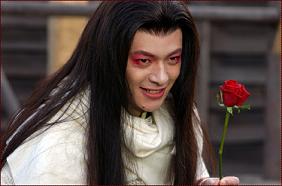Azumi


Young women who kick butt with long swords and short skirts are probably one of the reasons why the manga Azumi by Yu Koyama was so popular. The movie adaptation combines much of the same butt kicking, short skirts and swordplay into a nearly interminably long, repetitive movie. Azumi's manga roots are extremely evident. In a serialized format, creators are allowed time to explore characters or have recurring themes or stories. The hard part is taking a long story and translating it into a movie. For manga, it is important to make a smart decision. One can adapt the very beginning, or slim down the entire story, but retain essential elements. That didn't happen here. Director Ryuhei Kitamura (Godzilla: Final Wars, Alive) and adapters Rikiya Mizushima Isao Kiriyama (Godzilla: Final Wars, Alive) throw in too much.
This is most problematic in what happens along the way. Azumi (Aya Ueto, Install) is on a mission to assassinate three warlords who are not loyal to the Emperor. Kitamura follows Azumi on an excruciatingly long journey, even as obvious red herrings come and go. The setting is the Tokugawa Shogun period (late 19th century, which seems to be the favored setting for many recent movies). Azumi's parents were murdered when she was a child. She was rescued and taken to the mountains, where she trained with nine other children. Their sole mission was to grow up and kill traitors to the Emperor. They spent their entire lives on the mountain, isolated from everybody else.
After a horrifically bloody baptism of fire, five emerge ready to complete their mission. They are awed by simple worldly things, only because everything is new to them. However, one of their targets soon realizes that he is a target, and begins hiring people to stop them. Here is where Azumi begins to slow down. Azumi and her friends attack. Enemies counterattack and die. Azumi and her friends attack. More enemies counterattack and die. The battles are bloody and the swordplay is decent, but it all becomes the same after a while. None of Azumi's fellow assassins have anything distinguishable about them. They are bland Japanese supporting characters that slowly die off. Azumi looks strangely like a Catholic school, not like a samurai. Of course, this was probably done on purpose. She doesn't have much of a personality either. She does have a past, but Kitamura mostly sidesteps it. He does explore her growing conscience, as she questions the morality of killing people with little to no background. Violence follows her wherever she goes, and Azumi is tiring of this life. Too bad that the audience tires of the shenanigans long before then, even with a violently bloody battle at the end and a weirdly flamboyant antagonist.